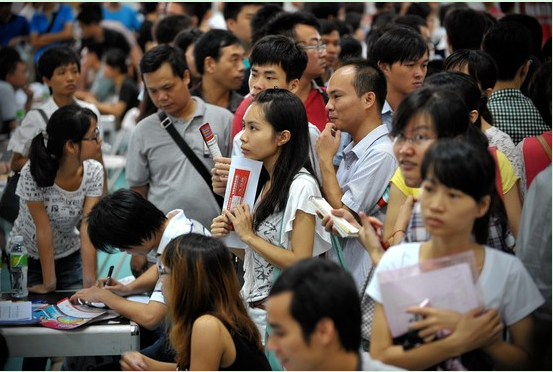(单词翻译:单击)

China's labor market has so far proved resilient despite a slowing economy, but that means little to recent college graduate Wu Xiuyan.
虽然经济增长放缓,事实证明目前为止中国劳动力市场依然保持坚挺。不过,这对刚毕业的大学生吴秀艳(音)来说并没有多大意义。
'My classmates and I want to find jobs in banks or foreign-trade companies, but the reality is that we can't find positions that match our education,' said Ms. Wu, 24 years old, who graduated in June from Zhejiang University of Finance and Economics. She has spent the time since then living at home and trawling recruitment websites.
吴秀艳今年24岁,6月份毕业于浙江财经学院。她说,我和同学都想在银行或外贸公司找工作,但我们面临的现实是找不到符合自己所学的职位。毕业之后,吴秀艳一直呆在家里,在招聘网站上找工作。
'I just want a stable, maybe administrative, job,' she said, 'but why is it so hard?'
她说,我只想要一份稳定的工作,或许是行政类的吧,但怎么就这么难找呢?
China has shown little evidence of rising unemployment despite the slowest growth rate since the global financial crisis - and is nowhere near the jobless rates seen in some of the countries hardest hit by the euro-zone debt crisis. But slowing growth underscores a fundamental challenge to China's economic development: the underemployment of huge numbers of graduates that Chinese colleges are churning out.
虽然中国经历着全球金融危机以来最低的增长速度,但鲜有证据表明其失业率正在上升。而且它的失业率远远不及欧债危机中某些受打击最严重国家的水平。但经济减速凸显了中国经济发展遇到的一个根本性挑战:中国高校培养的大量毕业生遭遇就业难。
Experts say that many of the graduates lack skills such as critical thinking, foreign languages and basic office communications that businesses are looking for. Even small private enterprises that offer humble salaries find many graduates unsatisfactory. 'Those small sales companies that desperately need people also reject us graduates,' said Ms. Wu. 'They say we don't have social resources or work experience that they need.'
专家说,很多毕业生缺乏企业所需的批判思维、外语和基本职场沟通等技能。就连工资微薄的小型私企也觉得很多大学生难以让人满意。吴秀艳说,那些极度缺人的小型销售公司也拒收我们这些毕业生,说我们没有他们所需的社会资源或工作经验。
At the same time, China has made only limited gains in remaking its economy so it relies more on services and innovation and less on construction and assembly-line manufacturing. That limits the markets for the lawyers, engineers and accountants that Chinese universities are producing.
与此同时,在从依赖建筑和水线生产到依赖服务和创新的经济转型方面,中国也只取得了有限的进展。这使中国高校培养的律师、工程师和会计师就业市场狭窄。
As a result, many graduates find they can get only low-skill jobs that pay far less than they imagined they would make and see a future of limited prospects. A survey of more than 6,000 new graduates conducted last year by Tsinghua University in Beijing said that entry-level salaries of 69% of college graduates are lower than those of migrant workers who come from the countryside to man Chinese factories, a figure government statistics currently put at about 2,200 yuan ($345) a month. Graduates from lower-level universities make an average of only 1,903 yuan a month, it said.
因此,很多毕业生发现他们只能得到工资远少于预期的简单工作,甚感前途渺茫。北京清华大学去年调查6,000多名应届大学毕业生发现,69%的毕业生起薪低于农民工。目前政府统计资料显示,农民工一个月的工资在2,200元(345美元)左右。清华大学的调查发现,非名校毕业生的平均月薪只有1,903元。
Li Junjie graduated in June from Communication University of China, majoring in broadcast journalism. 'It is getting even harder for us to get a job than the previous graduates of my major because fewer positions are left for me and my classmates,' said the 23-year-old native of Guangdong province, who is staying with friends in Beijing as he looks for work.
李俊杰(音)6月份毕业于中国传媒大学广电新闻专业。这位23岁的广东人目前正在北京找工作,他和朋友一起住。他说,现在我们找工作比前几届本专业的毕业生更难了,因为留给我和我同学的岗位越来越少。
'Media outlets here look for professionals or native English speakers, not fresh Chinese graduates with only a diploma.'
他说,北京媒体机构找的都是专业人士或母语为英语的人,不是只揣着一份文凭的国内应届毕业生。
While worker dissatisfaction hasn't manifested itself in public protests, it is bound to be a worry for China's top leaders who regularly stress the need to avoid social instability. China's productivity gains could slow if it can't better match the demand of its current job market and the skills of its graduates.
虽然劳动者的不满尚未表现为公开抗议,但它肯定会引起中国高层领导人的担忧,因为他们经常强调维护社会稳定的重要性。如果不能更好地将当前劳动力市场的需求与大学毕业生的技能匹配起来,那么中国劳动生产率的提升可能会放慢。
China's universities have churned out more than 39 million graduates with undergraduate or specialized degrees over the past decade, according to the Ministry of Education. People with some college education now account for about 8.9% of China's population, according to 2010 government data. While that's a much smaller proportion than the 37% of the adult population in the U.S, it's a sharp rise from China's 3.6% in 2000.
教育部数据显示,过去10年中国高校已经培养出3,900多万名本专科毕业生。2010年的政府数据显示,受过一定大学教育的人目前约占中国总人口的8.9%。虽然这个数字远远低于美国成年人口中37%的比例,但较中国2000年的3.6%却是大大提高。
The employment rate of college graduates last year was 90%, according to a survey by the Chinese Academy of Social Sciences and MyCOS Research Institute, a Beijing-based education consulting firm. But only 47% of the 256,000 graduates surveyed said they feel satisfied in their current job.
根据中国社会科学院和北京教育咨询公司麦可思研究院(MyCOS Research Institute)的调查,去年中国高校毕业生就业率为90%。但受访的25.6万名学生当中,只有47%的人表示对目前的工作满意。
'To solve the underemployment problem, you need to adjust the economy for the workforce that China has now,' said Chetan Ahya, an economist at Morgan Stanley.
摩根士丹利(Morgan Stanley)经济学家阿赫亚(Chetan Ahya)说,要解决就业难问题,就得为中国现有的劳动力调整经济结构。
'High-end jobs that should have been produced by industrialization, including research, marketing and accounting etc., have been left in the West,' said Chen Yuyu, professor at Peking University's Guanghua School of Management. Referencing the trade name of Hon Hai Precision Industry Co., the Taiwan company that makes gadgets for Apple Inc. and others in Chinese factories, he said, 'We only have assembly lines in Foxconns.'
北京大学光华管理学院副教授陈玉宇说,研发、营销和会计等本应在工业化过程中产生的高端岗位留在了西方,而我们只有富士康的流水线。富士康(Foxconn)是台湾企业鸿海精密工业股份有限公司(Hon Hai Precision Industry Co.)的商标名称,该公司在中国大陆的工厂为苹果(Apple Inc.)等公司代工生产电子产品。
A large population of college-educated workers with ambitions for better jobs could have long-term advantages, economists say. Educated labor could make China more appealing to both foreign and domestic companies hoping to add service-oriented jobs in China. The group so far also seems less likely to stir unrest than migrant workers, who in recent years have staged protests in some areas over low pay and other issues.
经济学家说,大量受过高等教育、期待获得更好工作的劳动者有望给中国带来长远优势。受过教育的劳动者有可能使中国在希望增加服务型岗位的内外资企业面前更具吸引力。另外,目前为止这一群体引起社会动荡的可能性比农民工群体更低。近几年一些地区曾有农民工因为工资低等问题而举行抗议活动。
'The underemployment is more a short-term problem,' says Albert Park, professor of Economics at Hong Kong University of Science and Technology. 'The demand will be there for China's graduates.'
香港科技大学(Hong Kong University of Science and Technology)经济学教授朴之水(Albert Park)说,就业难更多的是一个短期问题,对于中国大学毕业生来说,需求是会有的。


